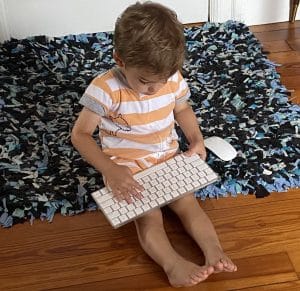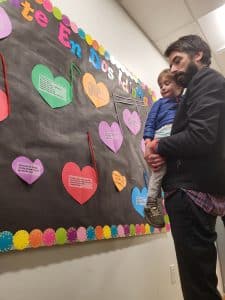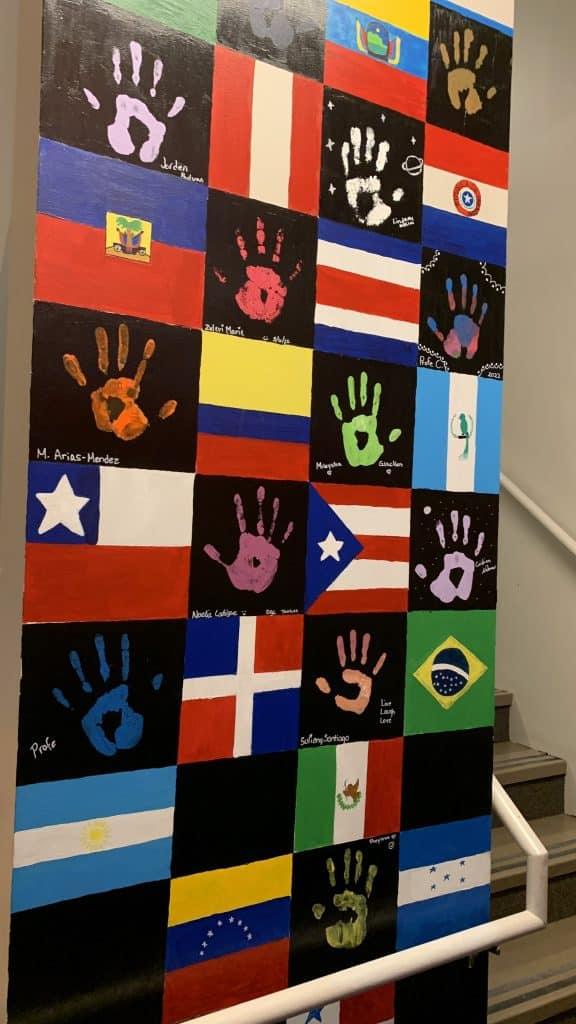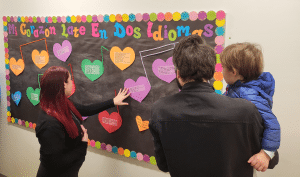Rethinking Learning Through Educator Micro-Credentials
CompetencyWorks Blog
This blog post is one of a series that highlights different experiences with the multilingual learner (MLL) micro-credential program developed by UCLA’s ExcEL Leadership Academy and highlighted in the Aurora Institute report: ExcEL Leadership Academy Micro-Credential Pathway Adoption in Rhode Island.
My son was a baby when I started working on the ExcEL micro-credentials for MLL certification, and my school was fully remote as we all navigated life in a pandemic. Between Zoom school and sleep training, I created projects on topics relevant to me and my students, their families, and my entire school community. I thought about how much education mattered and the disrupted time we were experiencing. I thought about how this could be done differently.

I was suddenly incredibly aware of the importance of family engagement, student voice, school culture, and access to our full linguistic repertoire in education. The ExcEL micro-credentials program let me bring these essential elements to life in a way that was authentic and impactful.
I had never experienced competency-based teacher training before, and it was a revelation. Clear rubrics and criteria for success? Specific feedback and resubmissions when I missed something? Embedded resources to use and the ability to find your own tailored resources? Creating a personalized project to demonstrate your learning, to use in your actual classroom with your actual students? This was how teacher education – and all education for that matter – should be.
In my work with the 12 micro-credentials, amid a host of experiences that have pushed my professional growth, there are a few things that especially stand out.
Fostering Positive School Cultures and Family Engagement for Multilingual Learners
When we returned to in-person school, many students were disengaged and struggling. As part of my evidence collection for the Fostering Positive School Cultures and Family Engagement for Multilingual Learners ExcEL Essentials micro-credential, I was able to shadow a student and see the school through their eyes. As a high school teacher, I primarily see students only in my class and in the hallways. Spending a full day with a student was quite a sobering experience.

- I saw them interact, or not, with their peers.
- I saw their teachers interact, or not, with them.
- I saw them interact, or not, with the content in their classes.
To be honest, I still think about that student and that day. It profoundly informed my work on student voice, school culture, and family engagement. I used to operate within the silo of my classroom, and interact nearly exclusively with the students within that space. Now, I try to see my students in a variety of settings, to learn who they are and what they need more holistically, and forge connections with their families as well. I used to consider family involvement to be enough, but now I see the value of true family engagement. I no longer believe school culture can be truly positive and impactful without the collaboration and engagement of families.
At the same time, I imagined my toddler son as a student in elementary school, then middle, then high school. I thought of how disconnected so many schools and teachers are from their students’ families – a disconnect I had shared until this point. I was deeply uncomfortable letting this continue. I was suddenly thinking about my students in a new light with what I was learning through the micro-credentials, and seeing it all now as a parent and an educator. One of the micro-credentials I am most proud of is the Family Engagement micro-credential. By working directly with our Family Community Liaison, I was connecting families not just to me, but to the school and community as a whole. We planned intentional and personalized family outreach with the specific students in my classes, while also creating a culturally informed family conference plan. We thought through sometimes overlooked items such as items to parking, best methods of communication, access to interpretation, and the times families could most easily attend. In this way, I was also working alongside others to strengthen the culture of the school and reconnect students with the school and their education after returning to in-person learning.
Creating Systems of Support for Newcomers

In the past couple of years, my school has received more newcomer students than ever before. While everyone is trying their best, the fact is our staff wasn’t prepared to best support these students, and we’re not the only school facing these challenges. For my Creating Systems of Support for Newcomers Advanced micro-credential, I created a student-led mentorship program, pairing my upper school students with a lower school class that needed language support. The mentor students were able to help their mentees with their English and accessing their schoolwork, but the true impacts went beyond that. They made connections to students who felt adrift in a new school, a new state, a new country. They planned community building activities for the younger students to connect with each other and with the mentors. They advocated for them, requesting meetings with school stakeholders to ensure the newcomer students were not retained because of their English language abilities. They created plans for how the school could and should be giving these students more support. They questioned why it wasn’t already happening.
Conclusion: Reframing for Learning that Matters
I have learned so much from the ExcEL micro-credential program, and that certainly is something I value and appreciate. However, the biggest effect for me was a fundamental shift in my framing of how learning can be demonstrated, as well as what learning is actually the most important for supporting multilingual learners.
For all we talk about preparing students for the real world, it can feel like we are operating in isolation of it. ExcEL allowed me to support my students in ways that mattered and encouraged them to bring in their full selves: their languages, their cultures, their families, their stories.

Learn More
- Let Educators Drive: Gradual Release to Learner-Centered Design
- Personalizing Professional Learning to Strengthen Personalized Learning for Students
- Science Competencies and Micro-credentials at Del Lago Academy

Michaela McCaughey is a high school Heritage Spanish teacher at Trinity Academy for the Performing Arts, a public charter school in Providence, RI. where she incorporates the arts, culturally sustaining and critical pedagogy, and (bi)literacy in her curriculum. Her students are creative artists who push and inspire her. Completely infatuated with reggaeton, street art, and all things Shakira, Michaela seeks to not simply “teach Spanish,” but to celebrate Latine identity, art, and language. She has a hilarious 3-year-old, runs, and reads to keep her sanity. She completed the sequence of 12 ExcEL micro-credentials this past summer.